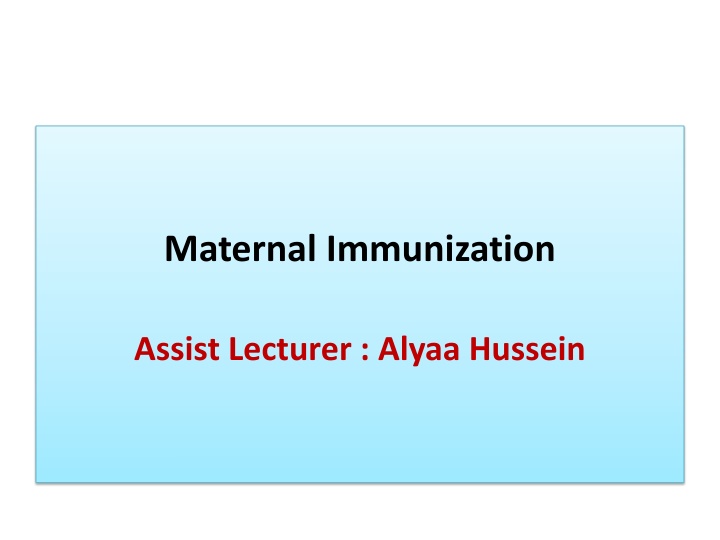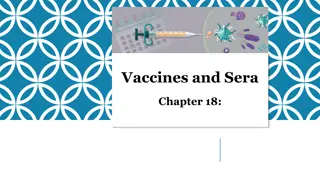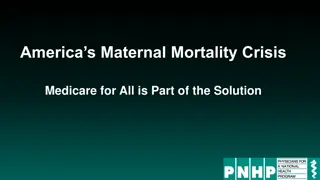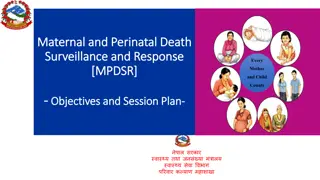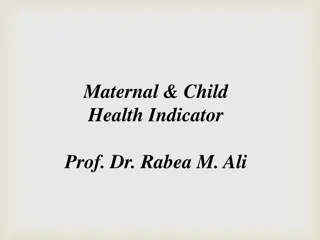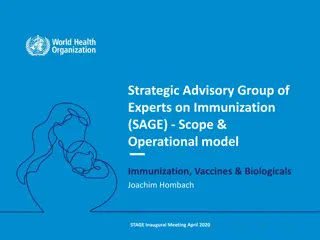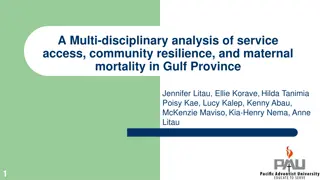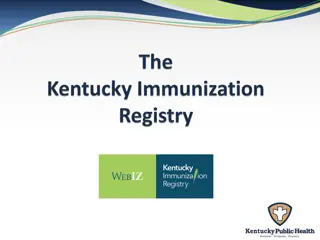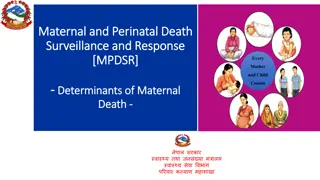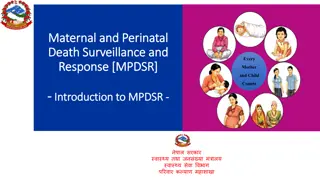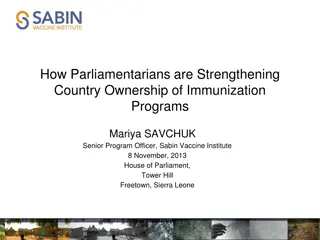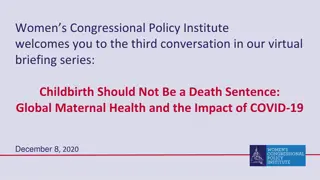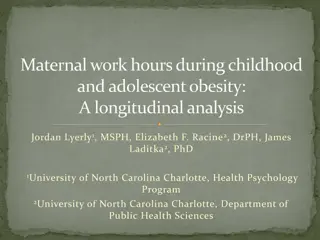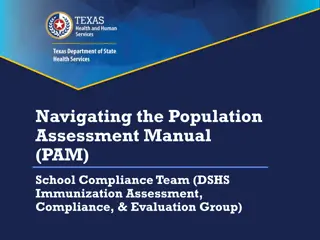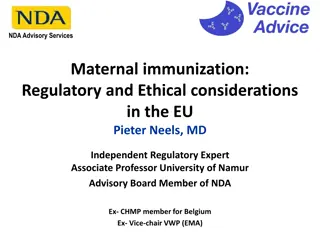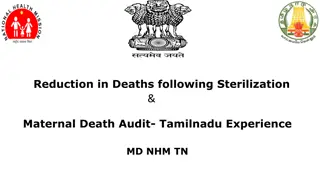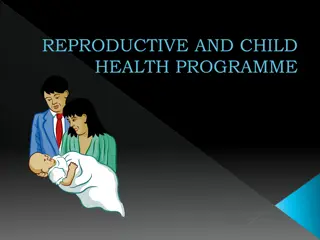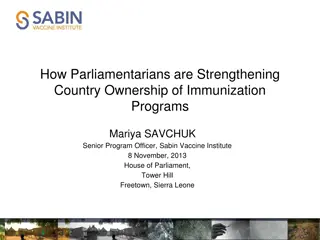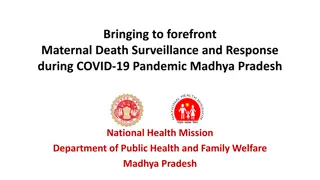Maternal Immunization
Maternal immunization is crucial in protecting both pregnant women and their fetus from vaccine-preventable diseases. Vaccines strengthen the immune system, passing immunity from mother to child, safeguarding the infant's health. Learn about immunity, vaccines, vaccination, and types of vaccines.
Download Presentation

Please find below an Image/Link to download the presentation.
The content on the website is provided AS IS for your information and personal use only. It may not be sold, licensed, or shared on other websites without obtaining consent from the author.If you encounter any issues during the download, it is possible that the publisher has removed the file from their server.
You are allowed to download the files provided on this website for personal or commercial use, subject to the condition that they are used lawfully. All files are the property of their respective owners.
The content on the website is provided AS IS for your information and personal use only. It may not be sold, licensed, or shared on other websites without obtaining consent from the author.
E N D
Presentation Transcript
Maternal Immunization Assist Lecturer : Alyaa Hussein
Maternal immunization provides important health benefits to both pregnant women and to their fetus. Vaccine-preventable diseases cause significant morbidity and mortality among maternal, neonatal, and young infant. Some infections are so serious even they can waste pregnancy, harm her baby during pregnancy or after delivery. These complications can be protected with vaccination..
This is why vaccinations are so important for pregnant mothers. Vaccines strengthen the immune systems of body that can fight off serious infectious diseases. A vaccine can help in protection of the mother's body from infections and this immunity passes to her baby during pregnancy. This immunity keeps the child safe during the first few months of life until baby gets his own vaccination
Definition of Terms Immunity: Protection from an infectious disease. If person is immune to a disease, so can be exposed to it without becoming infected. Vaccine: A preparation that is used to stimulate the body s immune response against diseases. Vaccines are usually administered through needle injections, but some can be administered by mouth or sprayed into the nose.
Vaccination: The act of introducing a vaccine into the body to produce protection from a specific disease. Immunization: A process by which a person becomes protected against a disease through vaccination.
A vaccine can confer active immunity against a specific harmful agent by stimulating the immune system to attack the agent. Once stimulated by a vaccine, the antibody- producing cells, called B cells (or B lymphocytes), remain sensitized and ready to respond to the agent should it ever gain entry to the body. A vaccine may also confer passive immunity by providing antibodies or lymphocytes already made by an animal or human donor.
Types of Vaccines There are several different types of vaccines. Each type is designed to teach the immune system how to fight off certain kinds of germs and the serious diseases they cause.
Vaccine type Vaccines of this type on U.S. Recommended Childhood (ages 0-6) Immunization Schedule Live, attenuated Measles, mumps, rubella (MMR combined vaccine) Varicella (chickenpox) Influenza (nasal spray) Rotavirus Inactivated/Killed Polio (IPV) Hepatitis A Toxoid Diphtheria, tetanus (part of DTaP combined immunization) Subunit/conjugate Hepatitis B Influenza (injection) Haemophilus influenza type b (Hib) Pertussis (part of DTaP combined immunization) Pneumococcal Meningococcal mRNA Covid -19
Flu Vaccination Influenza (flu) is a potentially serious disease that can lead to hospitalization and sometimes even death. Every flu season is different, and flu can affect people differently, but millions of people get flu every year, hundreds of thousands of people are hospitalized and thousands of people die from flu-related causes every year. Flu can mean a few days of feeling bad and missing work or it can result in more serious illness.
Complications of flu can include bacterial pneumonia, ear infections, sinus infections and worsening of chronic medical conditions, such as congestive heart failure, asthma, or diabetes. An annual seasonal flu vaccine is the best way to help protect against flu. Vaccination has been shown to have many benefits including reducing the risk of flu illnesses, hospitalizations and even the risk of flu-related death in children.
When should person get vaccinated? It s best to be vaccinated before flu begins spreading in the community. September 9and October10 are generally good times to be vaccinated against flu. Ideally, everyone should be vaccinated by the end of October. However, even if person are not able to get vaccinated until November or later, vaccination is still recommended because flu most commonly peaks in February2 and significant activity can continue into May5.
Additional considerations concerning the timing of vaccination for certain groups include: Adults, especially those 65 years and older, should generally not get vaccinated early (in July7 or August8) because protection may decrease over time, but early vaccination can be considered for any person who is unable to return at a later time to be vaccinated.
Children can get vaccinated as soon as vaccine becomes available, even if this is in July or August. Some children need two doses of flu vaccine. For those children it is recommended to get the first dose as soon as vaccine is available, because the second dose needs to be given at least 4 weeks after the first. Early vaccination can also be considered for women who are in the third trimester of pregnancy, because this can help protect their infants during the first months of life (when they are too young to be vaccinated).
Why should pregnant people get a flu shot? Influenza is more likely to cause severe illness in pregnant people than in people of reproductive age who are not pregnant. Changes to the immune system, heart, and lungs during pregnancy make people more susceptible to influenza severe enough to cause hospitalization throughout pregnancy and up to two weeks postpartum. Influenza also may be harmful for the developing baby. A common influenza symptom fever may be associated with neural tube defects and other adverse outcomes for a developing baby. Parental vaccination also can help protect a baby from influenza after birth (because antibodies are passed to a developing baby during pregnancy)
A number of studies have shown that in addition to helping to protect pregnant people from flu, a flu vaccine given during pregnancy helps protect the baby from flu for several months after birth, when he or she is too young to be vaccinated
MMR is a vaccine that protect against 3 viral infections measles, mumps and rubella. There are no single vaccines available for these infections. In New Zealand, the MMR vaccine is part of the childhood immunisation schedule for children at 12 months and 15 months of age.
Just one dose of MMR give a 95% chance of being protected against measles. The reason for a second dose is to make sure the 5% who need this second vaccine get immunity. Live attenuated vaccines do not usually cause problems in people who are healthy. If it does cause symptoms of the disease, it is milder than if you had caught the disease.
Why is vaccination against measles, mumps and rubella important? Vaccination with the MMR vaccine is the best way to protect against measles, mumps and rubella. While these infections may be mild in some people, they can cause serious complications in others. Measles: The infection can be serious, with 1 in 10 needing to go to hospital. Complications include diarrhoea (which can lead to dehydration), ear infections (which can cause hearing loss), pneumonia (which is the most common cause of death) and encephalitis (brain inflammation), which can cause brain damage.
Mumps: The symptoms of mumps are usually mild, such as swollen salivary glands (at the side of the face), headache and fever, but it can cause serious complications such as deafness, swollen testicles or ovaries, and meningitis. Rubella (also called German measles): This is usually a mild infection that gets better within about 7 10 days, but it becomes a serious concern if a pregnant woman catches the infection during the first 20 weeks of pregnancy. This is because the rubella virus can affect the development of the baby and cause severe health problems such as eye problems, deafness, heart abnormalities and brain damage. Measles, mumps and rubella are all easily spread from an infected person by coughing, sneezing or talking. They can be spread by face-to-face contact within a metre, or by touching an object infected from droplets, such as a used tissue or keyboard.
Measles can also be caught by breathing in the same air as an infected person, such as when walking past someone who has the disease. .
Women All women of childbearing age need to know if they are protected from rubella. In pregnant women, rubella can cause serious complications to the unborn baby, especially during the first 20 weeks of pregnancy. Immunity from the mother can stop the baby becoming infected. If mother was planning a pregnancy, check with midwife or doctor whether need to be vaccinated against rubella. When get vaccinated, avoid getting pregnant for at least 1 month afterwards. MMR vaccine is a live vaccine and should not be given to pregnant women.
How is the MMR vaccine given? The MMR vaccine is given as an intramuscular injection (injected into a muscle in the thigh or upper arm). It is given as 2 doses, usually at 12 months and 15 months of age.
What is the Tetanus vaccine? The tetanus vaccine is used to protect against tetanus infection. This is a serious disease caused by tetanus bacteria, which is found in soil and manure. If an adult or child has a cut exposed to soil, they could get tetanus.
Tetanus is caused by bacteria that enter the body through open wounds. The bacteria cause an increased tightening of muscles, resulting in spasms, stiffness, and arching of the spine. Ultimately, breathing becomes more difficult, and spasms occur more frequently. People of all ages can get tetanus. But the disease is particularly common and serious in newborn babies. This is called neonatal tetanus. Most infants who get the disease die. Neonatal tetanus is particularly common in rural areas where most deliveries are at home without adequate sterile procedures.
Other ways tetanus bacteria can get into the body are through: Open fractures where the skin is broken and the bone exposed Bite wounds Wounds that have foreign objects, such as wood splinters Crush injuries Burns Body piercings and tattoos Eye injuries Tetanus affects the nervous system and causes severe muscle contractions, mainly of the jaw and neck muscles.
Four kinds of vaccines used today protect against tetanus, all of which also protect against other diseases: Diphtheria and tetanus (DT) vaccines Diphtheria, tetanus, and pertussis (DTaP) vaccines Tetanus and diphtheria (Td) vaccines Tetanus, diphtheria, and pertussis (Tdap) vaccines Babies and children younger than 7 years old receive DTaP or DT, while older children and adults receive Tdap and Td
Tetanus toxoid immunization schedule for women of childbearing age and pregnant women without previous exposure to TT, Td or DTPa
COVID-19 Vaccines While Pregnant or Breastfeeding
Pregnant and recently pregnant people are more likely to get severely ill with COVID-19 compared with non-pregnant people. Getting a COVID-19 vaccine can help protect from severe illness from COVID-19. COVID-19 vaccination is recommended for people who are pregnant, breastfeeding, trying to get pregnant now, or might become pregnant in the future.
Pregnant people may receive a COVID-19 vaccine booster shot. Evidence about the safety and effectiveness of COVID-19 vaccination during pregnancy has been growing. These data suggest that the benefits of receiving a COVID-19 vaccine outweigh any known or potential risks of vaccination during pregnancy. There is currently no evidence that any vaccines, including COVID-19 vaccines, cause fertility problems in women or men.
Thank you Thank you
